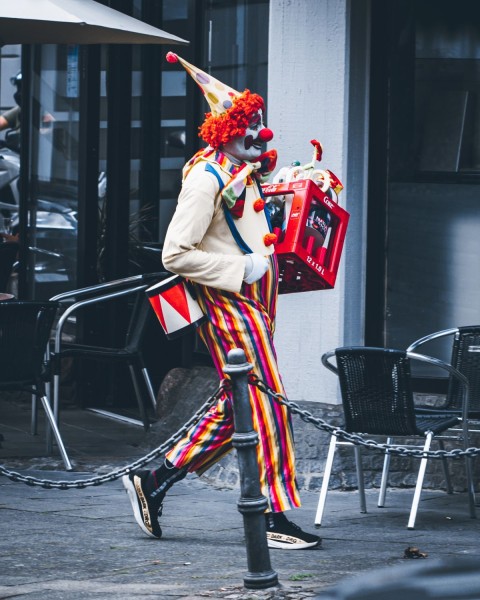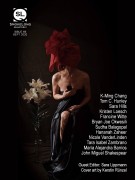1.
When M got a fellowship to study linguistics in Montréal, I went with her, because I loved her and I’d never had a savory crêpe. Here is something I learned about linguistics in Montreal: Let’s go to McDonald’s is not a charming expression, but Allons-y au MacDo is a very charming expression indeed.
One good thing about moving to a new country is that your flaws do not follow you—everyone knows this. On the drive north, we played Nina Simone with the windows down, screamed the lyrics into the wind. I wish I knew how it would feel to be free. We nearly hit a moose. The moose paused inches from our hood, calmly chewing cud. M whispered, do you think it knows we’re starting a new life?
At the border, when the border guard asked us the purpose of our trip, we answered in unison. We’re starting a new life! The border guard frowned, typed something into his laptop, and then told us to pull over on the left so he could search our car for drugs.
2.
We found a studio apartment in a building where everybody was in the circus. These people can’t all be in the circus, we thought. But it was true, they really were. The landlord was a clown, the janitor was a lion tamer, and our next-door neighbor was an internationally renowned tightrope walker named Stu.
The first thing we need to find, M said, is a laundromat. She was right; all our clothes smelled like camping. So I asked a couple clowns who hung around the apartment building’s patio, and they told me. Right at the bagel shop, left at the boulangerie, and you’ll see it: Laundro Royal Plus.
The laundromat was my weekly portion of solitude, set to the rhythm of turning machines. I took a pleasure in laundry-doing there that I’d never felt in any other kind of work—not at the bakery I’d quit in Boston, not in the punk bands I’d played in, not in the office job I’d once held for two weeks. While I waited for the clothes to dry, I’d lie on the plastic bench and think about the future.
3.
We spent that summer drifting from park to park, from the sun into the shade and back again. There was music in all the plazas downtown, and dancing in the club above the laundromat, and 24-hour drum circles in the parks where we went each afternoon to lie down and eat salami sandwiches in the heat. We were in love, but we barely noticed, because we were so warm all the time.
The news from our country was a murmur in the background of cafés and subway stations, like the far-off electric hum of some machine we’d learned to ignore. For weeks, we allowed ourselves to dream we weren’t from any country at all.
All summer long, I wanted more than anything to have a thought—just one clear thought. But nothing came. We went to the botanical garden, to the river, to the supermarket, and then home, to cover bread in salami and drift off to sleep. Only later did I realize we were happy.
4.
Fall arrived, and the city’s fountains went dry. A late September snow drove the pigeons from our balcony. One night in mid-October, the tightrope walker named Stu dropped by our apartment with a bowl full of pomegranates. In the politest and most Canadian way imaginable, he asked: So what do you fellows actually do?
I work in a lab, M said. I study the words people say when they’re asleep. Sounds creepy, an American might have said, but Stu only smiled. He offered me a handful of dry, gorgeous pomegranate seeds. Et toi? he said.
What exactly did I do? I used to play bass in a band called Nightfall, I told him. Now I’m trying to have a thought. Ah, Stu said, sounds very lucrative. Yeah, like the circus, I replied. Stu nodded. It was impossible to know if he was insulted. M put a pitying hand on my shoulder and said: He doesn’t have a visa, but he does the laundry very well.
5.
Two weeks later, though, while M was evaluating the snores of someone named Maurice, I left her favorite hoodie in the dryer. They had a TV in the laundromat, and I got distracted by the news. I’d forgotten about the American election. I ran out into the street to call M. Fuck, I said. Fuck, fuck, fuck, fuck, M said. I raced home so we could call our fathers, our mothers, our college roommates. Everybody said the same thing: fuckity fucking fuck.
Later, I held M on the couch while a light snow fell, watching her beat her high score on online Tetris again and again. This was her method, her koan against the world’s senselessness. The colorful blocks fit neatly into one another, and there was safety in it, there was control. Eventually, we slept. In the morning, she said: Where’s my hoodie? Ah, I said, fuck.
I ran back to the laundromat, but the hoodie was nowhere to be seen. The owner—la blanchisseuse—was sitting in a broad swath of yellow light by the door, playing cards with her son. Have you seen a hoodie, I said, a red hoodie, with a duck on it? She smiled. Non, she said, I cannot speak American. And then she turned to her son and said, Go fish, Gustave.



 The core workshop of SmokeLong Fitness is all in writing, so you can take part from anywhere at anytime. We are excited about creating a supportive, consistent and structured environment for flash writers to work on their craft in a community. We are thrilled and proud to say that our workshop participants have won, placed, or been listed in every major flash competition. Community works.
The core workshop of SmokeLong Fitness is all in writing, so you can take part from anywhere at anytime. We are excited about creating a supportive, consistent and structured environment for flash writers to work on their craft in a community. We are thrilled and proud to say that our workshop participants have won, placed, or been listed in every major flash competition. Community works.